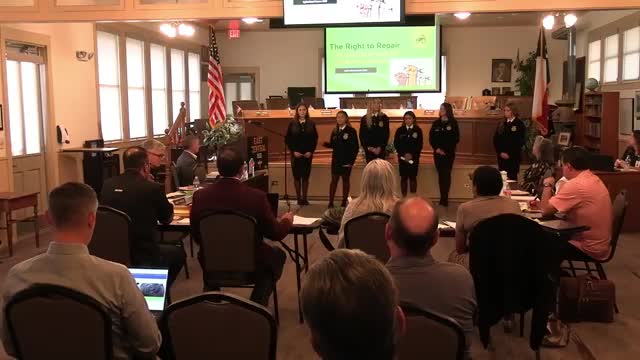Right-to-repair debate highlights farm repair costs, safety and intellectual-property concerns
Get AI-powered insights, summaries, and transcripts
Subscribe
Summary
Presenters at the EAST CENTRAL ISD meeting and affiliated speakers debated the merits of right-to-repair laws for agricultural equipment, citing farmer repair costs, a pending House bill and concerns about safety, liability and intellectual property.
Speakers at the EAST CENTRAL ISD meeting discussed the right to repair and its implications for agricultural equipment, farm finances and environmental sustainability.
Proponents at the meeting argued that repair restrictions imposed by manufacturers make modern farm machinery costly to maintain and limit farmers’ ability to fix time-sensitive breakdowns. Presenters said farmers operate on thin profit margins — citing a figure of 15.9 cents earned per food dollar from the National Farmers Union — and argued that restrictions on access to repair tools and software increase both repair costs and downtime. One presenter said House Bill 2963 will take effect on Sept. 1, 2026, and that it would prevent companies from voiding warranties on independent repairs and require release of repair tools or information for electronics costing more than $50.
Proponents also raised environmental arguments, saying repairable designs and local repair options can reduce e-waste. Speakers pointed to national estimates of U.S. electronic-waste tonnage and urged policies that allow refurbished and older, easier-to-repair machinery to remain in service.
Opponents who addressed the same meeting warned that right-to-repair laws could harm businesses and innovation. A speaker opposing the laws said releasing proprietary design information would erode competitive advantage, risk job losses and could jeopardize community livelihoods if manufacturers’ revenues fell. Opponents also raised safety and liability concerns, saying untrained repairers with access to core control systems could disable safety or emissions functions and potentially make equipment noncompliant with federal rules. The opposition noted surveys and industry statements suggesting illegal modifications can occur when control systems are altered and argued manufacturers already provide manuals and support to enable many consumer repairs.
Both sides cited large equipment manufacturers as examples: presenters referenced John Deere’s market share and electronic control systems; opponents compared Apple and Deere when discussing intellectual-property protections and R&D investments. The meeting transcript records competing claims about repair costs and company practices; speakers attributed figures and legal dates to outside organizations and legislation but did not document a formal vote or board action on the topic.
No formal motion or board decision about right-to-repair policy is recorded in the meeting transcript excerpts provided; discussion appears in public comment and presentation portions of the meeting record.
